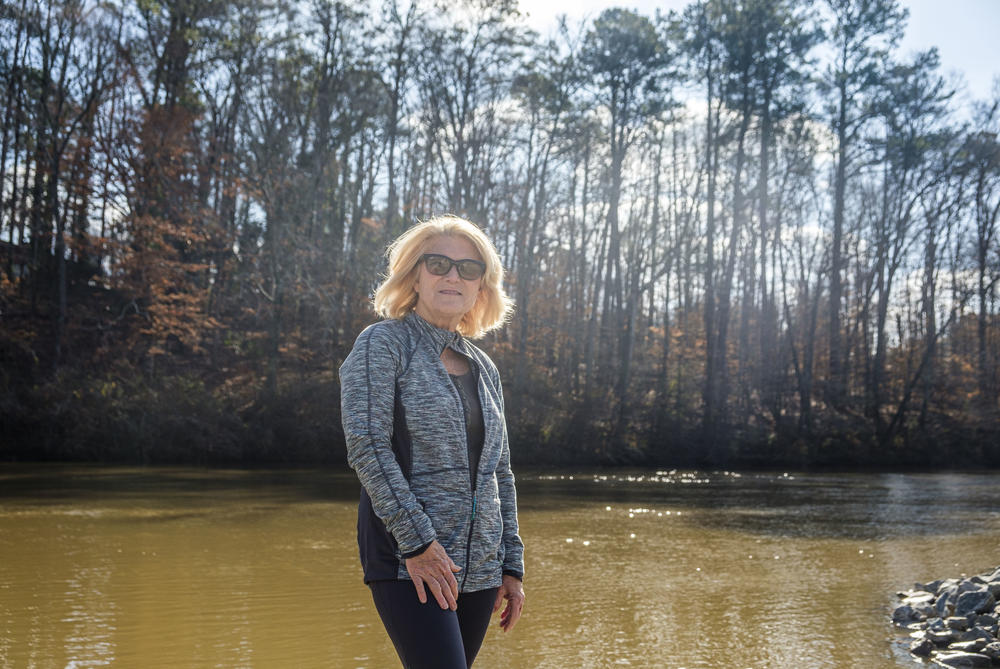
Section Branding
Header Content
Georgia Today: Barrow school board meeting; Wintry mix expected in Ga.; Carter and the environment
Primary Content
LISTEN: On the Wednesday, Jan. 8 edition of Georgia Today: Four months after a deadly shooting, students and parents at Appalachee High School demand security improvements; Georgians prepare for snow, sleet and ice over the weekend; and a look at the environmental contributions of the late former President Jimmy Carter.

Peter Biello: Welcome to the Georgia Today podcast from GPB News. Today is Wednesday, Jan. 8. I'm Peter Biello. On today's episode, four months after a deadly shooting, students and parents at Apalachee High School demand security improvements. Georgians prepare for snow, sleet and ice. And we'll take a look at the environmental protection efforts of the late former President Jimmy Carter. These stories and more are coming up on this edition of Georgia Today.

Story 1:
Peter Biello: Four months after a deadly shooting at Apalachee High School, students and parents there are demanding better security. GPB's Chase McGee reports from a Barrow County school board meeting last night.
Chase McGee: Board members heard from frustrated teachers, students and parents advocating for policy changes in the wake of September's mass shooting, which killed two students and two teachers. Multiple students advocated for weapons detection systems powered by artificial intelligence and repeated concerns that a safety plan hadn't been completed by the start of the second semester. Tanya Brown is the parent of a child at Apalachee High School. She says she's frustrated with a lack of transparency from the board.
Tanya Brown: I would like the district to provide an open forum and implement some kind of weapon detection system immediately. I want you to move and act like you care.
Chase McGee: A notice on the school board's website says they will review the results of a safety survey at a second meeting later this month. For GPB News, I'm Chase McGee.
Story 2:
Peter Biello: Gov. Brian Kemp has unveiled a plan to spend $600 million to restore order in Georgia's prisons. State Department of Corrections officials made a wide-ranging budget request at a meeting of State House and Senate Appropriations Committee members yesterday. Most of the new spending would go toward staffing and pay, but there's also at least a quarter-billion dollars in proposed facility and technology upgrades, including a new state prison. The improvements are aimed at addressing problems the U.S. Department of Justice identified in a scathing report last year. Federal investigators detailed levels of violence and other issues that they found to violate the constitutional rights of incarcerated people.
Story 3:
Peter Biello: Snow, sleet and ice are in the forecast for North Georgia on Friday. And regardless of exactly how much and where the wintry mix comes, widespread school and work-from-home plans are expected. State and local officials are most concerned about road safety. GPB's Amanda Andrews has more on preparations.
Amanda Andrews: Leaders from the Georgia and Atlanta Departments of Transportation are urging drivers to stay off the road on Friday. Their crews have begun to salt the roads to prevent ice from forming when rain or snow comes down. Joe Schulman is with GDOT. He says 2014's "Snowmageddon" that stranded people on roads and highways is on everyone's mind.
Joe Schulman: We all went through it. Nobody wants to go through anything like that again. So in the time that's passed since then, technology has improved. We've got — our resources are better managed. We're ready to go. We've been planning for this.
Amanda Andrews: Overnight, temperatures are forecasted to be below freezing through Sunday. For GPB News, I'm Amanda Andrews.

Story 4:
Peter Biello: As the world remembers former President Jimmy Carter, who died on Dec. 29, lovers of Georgia's Ossabaw Island are celebrating his role in saving it from development. In 1978, then-President Carter facilitated the sale of the undeveloped island to the state as a heritage preserve. The late Eleanor "Sandy" Tori-West was part of the family that sold the island to the state for a fraction of its value. She told GPB in 2000 that without the sale, the island was in danger of becoming an overdeveloped coastal resort not far from Savannah.
Eleanor "Sandy" Tori-West: Then Jimmy Carter came along and he — he sat on the floor at my feet, and I was sitting in the picture window there and said, "Now what do you think Ossabaw should be?" So I said, "Come and take a walk with me." So we walked all the way down to Cambridge Garden and back, and I said, "Ossabaw is a miracle." It's not only ecological miracle, but it's — it's powerful. And it's, it's — it's just beyond price. I mean, it just simply cannot be ruined. And he thoroughly agreed.
Peter Biello: Carter campaigned as recently as five years ago when state lawmakers proposed a bill that would have opened up state heritage preserves to private development. Ossabaw Island today remains only accessible by boat and only for scientific, educational and cultural uses. It's managed by the Georgia Department of Natural Resources and the Ossabaw Island Foundation.
Story 5:
Peter Biello: Former President Carter was known as one of the most conservation-minded presidents. Carter biographer Jonathan Alter says his environmental ethic left a lasting legacy.
Jonathan Alter: He doubled the size of the National Park Service, one of his many underappreciated accomplishments with the Alaska Lands bill and many other things that he did environmentally. And then, of course, you know, the the first fuel economy standards, the first toxic waste cleanup. The first funding for green energy. The list goes on and on and on of what he did for the environment when he was president.
Peter Biello: Carter is being remembered as a protector of rivers. As Georgia governor, he canoe down the Chattooga River in Northeast Georgia and was instrumental in its designation as a wild and scenic river. Buzz Williams is a former executive director of the Chattooga Conservancy and was active in the river's conservation when it was protected as wild and scenic in 1974.
Buzz Williams: And they took Jimmy Carter down the river, put him in a canoe. And of course, he immediately, like everybody, fell in love with the Chattooga and came back the next year and ran it in a kayak.
Peter Biello: In fact, Carter was part of the first team ever to go down the river's challenging Bull Sluice Rapid in an open canoe.

Story 6:
Peter Biello: Carter also canoed and protected the Flint River in Southwest Georgia. GPB's Grant Blankenship has that story.
Grant Blankenship: A little west of Thomaston is a place called Sprewell Bluff. Face the water, and hiking trails lace the hill behind you, rising from the beach. In front of you, past shoals and a boulder people jump from in the summer, jutting 500 feet out of the water, is the Sprewell Bluff. West from the bluff, you'll find rare old-growth longleaf pine forest. A little north that blends with plants you'd find in the Appalachian Highlands like mountain laurel. Sprewell Bluff Park coordinator Sarah Williams works in the camp store back up the hill. Williams loves this place as much as visitors, although she says they aren't always sure what they're seeing.
Sarah Williams: You know, we have people even call this a lake down here. We're like, "No, it's a river, you know," so.
Grant Blankenship: The Flint River. And believe it or not, at one time, Sprewell Bluff came very close to being the bottom end of a lake, if not for Jimmy Carter. Janet Morgan Mapel remembers being excited about the idea of a new lake when she was a child.
Janet Morgan Mapel: I'm thinking water skiing. I think I had just learned to water ski and how nice it was when I'd go to lake, you know, and I didn't I wasn't a part of Dad's business or part of the agriculture or whatever, but I was a part of hearing him so concerned.
Grant Blankenship: Tom Morgan was Mapel's dad, and in the 1970s, when Mapel was in the eighth grade, her dad was a farmer and ran a fertilizer business in the town of Woodbury. Maple says her dad was concerned because he loved — maybe even lived for the trips down the Flint River that started right out their back door.
Janet Morgan Mapel: We would just slide the canoe down.
Grant Blankenship: Like otters down the riverbank and off they'd go past Pine Mountain. Dripping Rock. Pasley Shoals.
Janet Morgan Mapel: You've got the spider lilies down the way. You've got mussels. You've got the river shoal bass.
Grant Blankenship: Up on the bluff, there are endangered red-cockaded woodpeckers and bachman's sparrows. There are coral snakes. But back in the 1970s, politically powerful entities, including the ironically named U.S. House member Jack Flint, wanted the dam. Tom Morgan would tell anyone who would listen to oppose the project of the Army Corps of Engineers that would have drowned the lilies, the shoals, and would have left a lake lapping at his door.
Janet Morgan Mapel: If he was going to give a speech, he would practice at home and I would hear him.
Grant Blankenship: The allies he won often shared traditions of farming and outdoor life. And luckily for them, one of their own was in the governor's mansion.
Janet Morgan Mapel: A lot of other outdoor people were involved in even getting Jimmy Carter to get on the river and go down it and just to see: Before you make any decision, see what you are going to be destroying.
Grant Blankenship: That's what Gov. Jimmy Carter did. "I personally canoed down the river twice," Carter writes in the preface to a 2001 book by Fred Brown and Sherri Smith called A Recreational Guide to the Flint River. And Carter was really taken by the beauty he saw. "The wildlife that exists in that river corridor," he wrote. "Otter, Fox, Muskrat, Beaver, Bobcat. You cannot describe it." On the other hand, Gov. Carter was a businessman who had a responsibility to consider the economic impact a new lake might make. Martin Doyle is a professor of environmental science and public policy at Duke University and an expert in U.S. water policy. He says this is where another, more fundamental side of Carter came into play.
Martin Doyle: You know, Carter was an engineer. I think he was a nuclear engineer from from Annapolis.
Grant Blankenship: In the U.S. Navy. And so Carter, the engineer —
Martin Doyle: The way that he seems to make sense of it is, is I got to go and look at these numbers myself.
Grant Blankenship: By numbers, he means the cash benefits the Army Corps of Engineers said would flow into communities around Sprewell Bluff after the dam was done.
Martin Doyle: And Carter kind of dug into them and he said, well, No. 1, I think that they're overestimating the benefits.
Grant Blankenship: Carter was far more blunt. He called the Corps of Engineers economic projections, quote, "a complete passel of lies." So Gov. Carter vetoed the Sprewell Bluff Dam. He ended it. Later. President Carter remained convinced he'd found a pattern of overpromising around federal dam projects. He would veto projects across the country.
Martin Doyle: And that — that pivot in particular sets the dam building industry back on its heels.
Grant Blankenship: Some got built anyway. But Martin Doyle says before he left office, Carter left behind some of his way of thinking about dams and how they should be built. And it had to do with who was paying.
Martin Doyle: If the federal government was spending — was paying for 100% of the cost, there's no reason for a congressional representative or a senator or the local community to not want a project.
Grant Blankenship: Or as Carter wrote, one of the congressman's goals in life was to have built in his district a notable dam at federal government expense that created a lake that could be named for him. For Carter, this was the very definition of pork barrel politics.
Martin Doyle: And what Carter started was what was called a local sponsorship: that the local benefiting community had to put up about 25% of the costs of a dam.
Grant Blankenship: And once the people in town, like at the Chamber of Commerce or in the grocery store, were told to dig in to what felt like their pockets for millions of dollars, they'd have to ask themselves, "How much do I really want to water ski?"
Martin Doyle: Exactly right. And do you do you value it that much?
Grant Blankenship: It was a fiscally conservative move.
Martin Doyle: In this way. He was Reagan before Reagan was Reagan.
Grant Blankenship: Under President Ronald Reagan, the mandated local buy-in for a federal dam would ramp up to 50% of the price tag. Doyle says that, plus a general lack of easy places to dam meant half as many new projects in the decade after Carter left Washington. Jimmy Carter apparently never quit caring for the Flint River. As recently as 2008, Georgia politicians again floated the idea of a Sprewell Bluff dam, this time to satisfy a thirsty Atlanta. Carter, by then a Nobel Peace laureate, spoke for the river again, and the idea faded away. "Lakes and dams are everywhere," Carter said in the preface to that 2001 guidebook. "But to experience something that is undisturbed and has its natural beauty," he asked. "You hope and pray that it will be there a thousand years in the future, still just as beautiful and undisturbed." For GPB News I'm Grant Blankenship in Upson County.
Peter Biello: And that's a wrap on this edition of Georgia Today. Thank you so much for tuning in. Remember, you can always find the latest updates on our news stories at GPB.org/news. And remember to subscribe to this podcast. We'll be back in your podcast feed tomorrow afternoon with all the latest news and you won't want to miss it. Subscribe and we will pop up automatically in your feed. And if you've got feedback, send an email to us. Our address is GeorgiaToday@GPB.org. I'm Peter Biello. Thanks again for listening. We'll see you tomorrow.
---
For more on these stories and more, go to GPB.org/news



